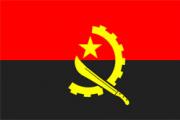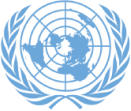SECURITY COUNCIL
Open Debate
Children and Armed Conflict
2 AUGUST 2016
Statement
Mr. President,
We congratulate Malaysia for the assumption of the Security Council Presidency for the month of August; we express gratitude for the convening of this Open Debate and commend the Malysian delegation for the excellent work and dedication in chairing the Working Group on Children on Armed Conflict. We ensure you, Mr. President, of Angola's full cooperation for the success of the Security Council proceedings during your presidency.
We thank the insightful remarks by the Secretary General; a especial word of praise goes the Special Representative for Children and Armed Conflict, Mrs. Leila Zerrougi, while we commemorate the 20th anniversary of the establishment of the mandate. We pledge to Mrs. Zerrougi our full political backing to the outstanding mission entrusted upon to the Office for Children on Armed Conflict; we also thank the Executive Director of UNICEF, Mr. Anthony Lake for his remarks and for the work of UNICEF to better the fate of children all over the world.
Mr. President,
Current conflicts impact disproportionately on children. Civilians are the main victims of indiscriminate attacks, with disturbing repercussions on children. The Report of the Secretary General on Children and Armed Conflict highlights serious challenges to the protection of children and the increasing violations inflicted upon them.
Afghanistan, Syria, Iraq, Somalia, South Sudan, Yemen, RDC, Nigeria, Palestine are some of the instances, reported by the United Nations, of children brutally killed or injured, maimed, abducted, forcibly recruited into armed groups and exposed to sexual abuse and exploitation.
A gruesome reality shows an increasing number of children affected by violent extremism: they are used as executioners or suicide bombers; are targeted by acts intended to destroy, humiliate and terrorize communities and force them into compliance; are subject to massive displacement and to all sorts of trafficking, including slave trade.
The SG report highlights cases of liberty deprivation of children formerly associated with extremists or armed groups, without due process. In our view, these cases should be carefully reviewed since, many of these children are victims and should be treated as such.
Member States must ensure that trial procedures are consistent with international juvenile justice standards, the principle of best interest of the child and their specific needs and vulnerabilities. Reintegration, not punishment of children formerly associated with armed groups should be the priority.
Mr. President,
A very disturbing trend are the increasing attacks of densely populated areas by military forces, and armed and terrorist groups against schools, hospitals and medical facilities. These criminal actions must end and, in due time, the perpetrators held accountable.
Security Council Resolution 2286 (2016) recently adopted, recalls the specific obligations, under international humanitarian law, to respect and protect, in situations of armed conflict, medical and humanitarian personnel, their means of transport and equipment as well as hospitals and other medical facilities, and ensure that the wounded and sick receive the medical care and assistance required.
Member States and the international community must do all in their power to help protect schools, students and teachers in situations of armed conflict and ensure that schools remain a safe place, while strictly respecting its civil character.
Angola has recently adhered to the Safe Schools Declaration, adopted at the Oslo Conference in May 2015, endorsing the Guidelines for Protecting Schools and Universities from military use during conflict, a process driven by Member States, civil society and child protection actors.
Another area of concern is the continuous allegations of sexual exploitation and abuse by United Nations Peacekeepers, Civilians and Non-United Nations international forces.
For that matter, we share the view that peacekeeping operations should establish a mandatory pre-deployment requirement for all troop contributing countries, in training for children protection, aimed at radically changing the current state of affairs.
The systematic inclusion of Children Protection Advisers in the mandates of special political and peacekeeping missions are important measures in making troop contributing countries and individual members of peace keeping missions further aware of this critical issue.
Mr. President,
In a positive note we would like to underline progress made by the “Children Not Soldiers” campaign. The commitments made by Governments involved in the campaign bring them into compliance to international standards barring the recruitment and use of children in armed conflict. Governments listed in the annex of the SG report are now implementing actions plans, with the United Nations, aimed at eliminating the recruitment and use of children in national security forces.
Most parties listed in the report are non-state armed groups. We call on the United Nations to continue deploying efforts in identifying concrete commitments by engaging with armed groups, in order to attain new action plans, while implementing existing ones, towards the end of recruitment and use of children as soldiers.
The engagement with non-state armed groups had remarkable results, and namely in the Central African Republic: the signing of an agreement to end the recruitment, use and other violations against children, led to the release, during the Bangui Forum in 2015, of over 3.000 children from the ranks of signatory armed groups.
Colombia, Mali, Myanmar, Philippines, Sudan and South Sudan also constitute examples of progress in this sense.
The inclusion in peacekeeping and peace building processes of specific commitments related to child protection, the provision of requirements for the rapid release of children from armed forces and non-state armed groups and their social reintegration are, in our view important measures in pos-conflict situations.
In concluding, Mr. President, ongoing armed conflicts have resulted in the forced displacement of ever-growing numbers of people. In 2015
Children constituted half of the refugee population, many of them unaccompanied or separated from their families and in high risk situations.
Preventing the outbreak of conflicts is still the best way to protect children. Unfortunately, the international community still lacks appropriate tools for effective preventive action. Meanwhile, the protection of children in armed conflict must continue at the center of the international community priorities, and be dealt through a comprehensive strategy of active protection and humanitarian response.
I thank you Mr. President.


